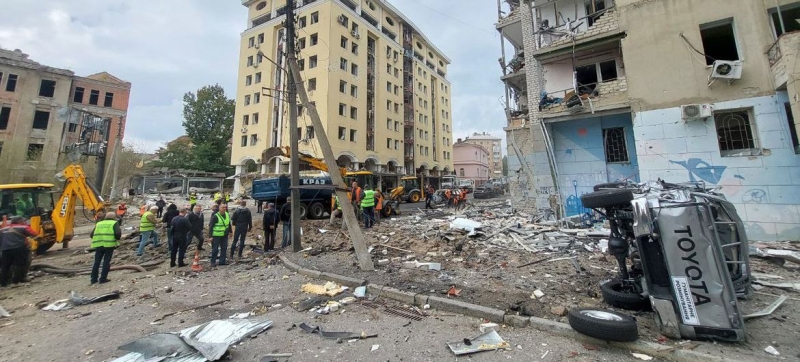
Destruction in Kharkov, Ukraine. INTERVIEW | “It’s difficult to describe in words” the scale of the tragedy in the Kharkov region Humanitarian aid
About 10 thousand residents of the Kharkov region were forced to leave their homes in front-line and border areas due to the escalation of attacks by the Russian Federation. Alexander Mundt, Chief Coordinator of the Office of the United Nations High Commissioner for Refugees (UNHCR), has witnessed first-hand the resilience of communities and the humanitarian community in the face of horrific events.
UNHCR is helping to evacuate those residents of affected areas who are unable to leave on their own. In an interview with UN News Service, Mundt spoke about the emergency response and the traumatic circumstances he has witnessed in recent weeks.
“The situation is truly terrible and the civilian casualties are indescribable,” he said.
Mundt believes part of the tragedy is that people understand that they might never return home as their villages were completely destroyed. “There is no doubt that attacks are being made on civilian infrastructure, on people’s homes, and thus the established way of life is being destroyed,” he noted.
Most of the people coming off the evacuation buses are grandparents or people with disabilities, he said, and they are absolutely devastated by what they experienced. “It’s hard to even put into words the level of trauma you see among the people getting off the buses. They’re shaking, they can barely hold a cup of water in their hands. They are so traumatized that they can hardly speak. They can’t hold back their tears,” a UNHCR representative describes the situation.
Humanitarian Community
At the same time, he highly appreciates “ a united effort” of humanitarian organizations working on the ground. According to Mundt, UN Coordinator for Ukraine Denise Brown, who recently visited Kharkiv, noted the “extraordinary level of preparedness and response to the situation.”
There are about 25 non-governmental organizations operating at the evacuee transit point, providing everything from hot meals and blankets to medical care, referrals for social services, helping people find temporary housing, emergency financial support, and legal advice to replace documents. “I think this is a really great example of what the humanitarian community can achieve when we work together,” he said.
Additionally, most of the organizations in the transit center are These are local NGOs staffed by volunteers. Mundt particularly noted the work of two UNHCR partners. According to him, Proliska employees actually risk their lives to get to villages on buses and escort vulnerable people to safety. At the same time, their transport was fired upon three times in a week. Another organization, Right to Defense, provides legal support and registers people for funds. Buses continue to arrive until 10 or 11 p.m., but employees are not asked to go home or take a break, Mundt noted.& nbsp;
Speaking about the work of his colleagues, he emphasized that there is an incredible spirit of mutual support in the humanitarian community, because spending 12 hours a day watching a disaster in real time and empathizing with the victims is “very, very, very difficult.” A sense of common purpose and determination to overcome all holds the humanitarian community together, he noted. UNHCR’s first priority is to help evacuate people safely and to ensure that humanitarian assistance is focused on the medium to long term. “What can we do beyond providing blankets, beyond the obvious,” Mundt explained.
For single elderly people moving out of villages, it is important that their temporary housing is filled with people they know and trust, he said. Isolation from society in a new place will only worsen the problem, Mundt emphasized. He also believes that humanitarian organizations, in addition to providing material assistance, need to support people so that they can be free in their choices, feel a little hope and recover from what they have experienced.
Read also:
INTERVIEW | Drone attacks and glide bombs are a daily reality for civilians in Ukraine
Despite their amazing resilience, evacuated residents of the Kharkov region need support. “Many of them have literally lost everything at the age of 85. So every time I see these people getting off the buses, I think about my own grandmother, or that this could happen to anyone,” said the UN official.
He also emphasized the important role of human factors and self-help networks, which in some way help people create a new family among the displaced. According to him, in the centers where people are accommodated, young people help with laundry and shopping for those who are not able to cope with it on their own. Children walk with elderly people. This creates a sense of community and resilience, and the human spirit is reborn over time, the UN News Service interlocutor added.
Preparing for winter
Speaking about the situation in Kharkov, Mundt noted that the energy system faces enormous risks: many people live in conditions of rolling blackouts or without electricity at all. If the power supply is not restored, then the work of the sewage system and water supply will also be under threat, he warned.
Also, the UNHCR representative said that local authorities are already concerned about the situation that will develop next winter, namely how people will keep warm, how they will survive the winter, and whether city residents and displaced persons will be able to stay in Kharkov if events develop in the worst case scenario.
Under the leadership of Denise Brown humanitarian organizations are already transporting food, non-food items, blankets, mattresses and preparing personnel in case supply routes are cut and access to markets is disrupted, Mundt noted. At the moment, the seriousness of the problem cannot be underestimated, he emphasized.
